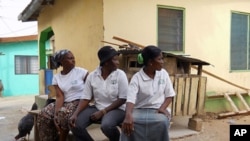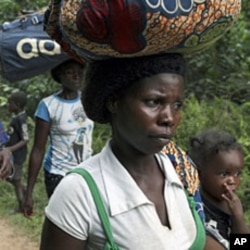The Maryland-based group Women for Democracy and Peace in Africa states as its goals helping African women displaced by violence and encouraging them to take part in politics and peacemaking.
Member Rebecca Affi is from Ivory Coast. She is nervously following the intensifying violence in her divided home country, where two men are claiming the presidency. U.N. officials report rapes are being committed by armed groups supporting both sides.
"Women are the first victims. When these problems occur, they are the ones who are persecuted. So it is very, very dangerous," Affi said. "That is why we all have to put our hands together and try to solve these issues because when the giver of life is in danger, a whole generation is in danger, this is how we have to see it."
Her organization is helping pay the schooling of ten girls across Ivory Coast. She says such initiatives seem small, but she believes it is only when more women are educated and reach positions of power that Africa will be able to have more security.
"Families are sustained by women and women are the pillars. Women are those who educate the children so we wanted to help our sisters, and educate them because for us the real democracy, the true democracy, can only be achieved by the education of women,"Affi said.
Saturday, her organization is sponsoring a conference in Washington looking into the issues of women and democracy in Africa, as well as case studies concerning Guinea and Togo.
Another woman who is helping Africa's war-affected women is American Sally Black. She found out about the Buduburam refugee camp in Ghana while reading the news several years ago. Hundreds of Liberian women have lived there since fleeing their home country, some of them more than 20 years ago.
Last year, Black launched a micro-lending project to empower women refugees in West Africa called One Step One World. She visited the women at the camp last month and keeps in close contact with them by phone and Internet.
"I think the primary lesson was nobody had ever asked them what can you do to help yourself?" Black asked. "They had grown quite accustomed to handouts and U.S. aid but no one had ever said to them. 'Well, I have resources so what can you do to help yourself if I am able to help you with some resources?' And the program was theirs from day one. The micro-lending was not my idea. It was theirs."
Black used her own funds, and then got money from friends and acquaintances, before setting up a donation link on the group's website and blog. She said building trust with the women in the camp was much more difficult than raising money.
The project has helped set up a small school, an after-school program, hair salons, food stands, clothes businesses, as well as a sewing project enabling women to sell their own bags. Many women initially dropped out because of health emergencies, so Black set up a medical fund. There is also guest housing for other volunteers, who have also brought in more donations.
One of the beneficiaries, Oretha Zulu, lives at the camp with her 14-year-old daughter. She says more help is always welcome.
"We need lots of support here. We need some machines to help the women because more and more women are interested in the sewing project. More and more women, they are interested in learning how to read and write," said Zulu.
Black and women from the camp are now looking into ways to help them return to Liberia. They have been fearful to go back because of past violence and also because they have no money or housing to start over. Zulu says one encouraging sign for herself and other African women has been the presidency of Ellen Johnson-Sirleaf back in her home country in Liberia. The only elected female president in Africa is expected to seek a second term later this year.





